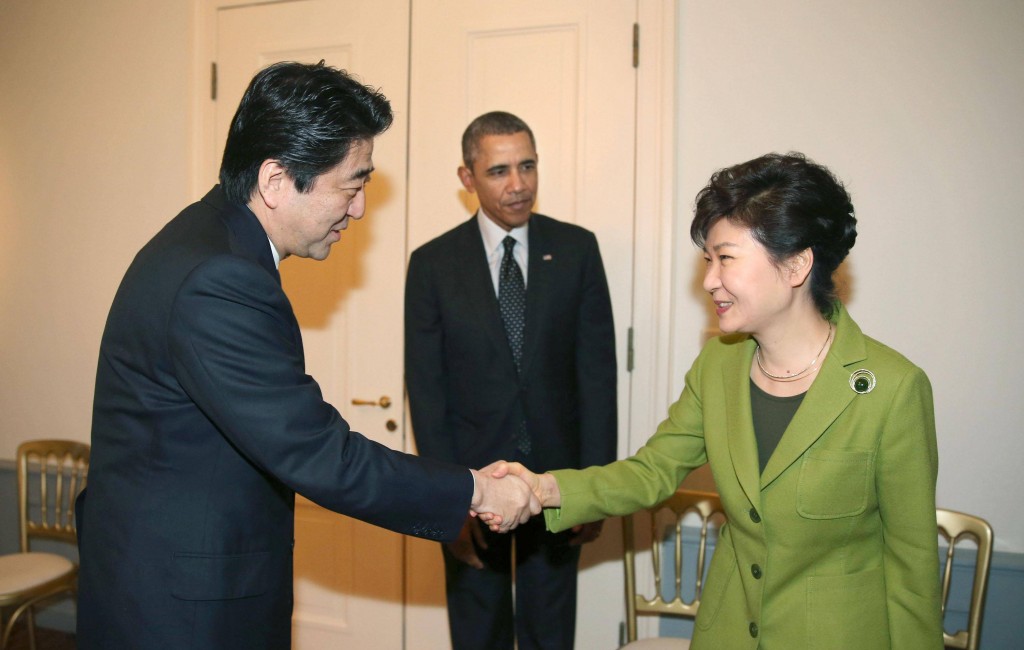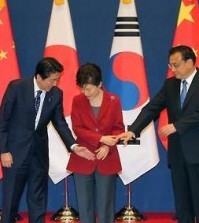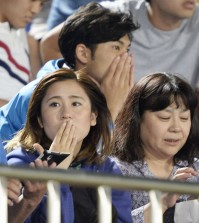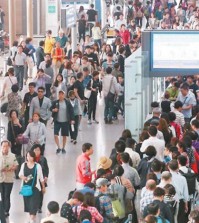- California Assembly OKs highest minimum wage in nation
- S. Korea unveils first graphic cigarette warnings
- US joins with South Korea, Japan in bid to deter North Korea
- LPGA golfer Chun In-gee finally back in action
- S. Korea won’t be top seed in final World Cup qualification round
- US men’s soccer misses 2nd straight Olympics
- US back on track in qualifying with 4-0 win over Guatemala
- High-intensity workout injuries spawn cottage industry
- CDC expands range of Zika mosquitoes into parts of Northeast
- Who knew? ‘The Walking Dead’ is helping families connect
U.S. calls for Japan to build ‘strong, constructive’ ties with S. Korea, China

President Park Geun-hye and Japanese Prime Minister Shinzo Abe shake hands during a trilateral summit with President Barack Obama at the U.S. embassy in The Hague. (Yonhap)
WASHINGTON, Jan. 6 (Yonhap) — The United States called Tuesday for Japan to build “strong and constructive” relations with its neighbors as it welcomed Japanese Prime Minister Shinzo Abe’s plan to express remorse in a special statement marking the 70th anniversary of the end of World War II.
“We welcome Prime Minister Abe’s comments yesterday, including the positive message on history issues and Japan’s post-war contributions to peace,” State Department spokeswoman Jen Psaki said at a regular press briefing.
“We believe that strong and constructive relations between countries in the region promote peace and stability and are in the interests of both the countries, as well as the United States,” she said.
In his New Year’s news conference on Monday, Abe said he would include Japan’s remorse over the war and how the country will contribute to the region and beyond when he issues the special war-end anniversary statement in August.
In her first response to Abe’s remarks, Psaki on Monday took note of two previous statements of apology that Japan has issued over the war — the Murayama and Kono statements — saying they “marked important chapters in Japan’s efforts to improve relations with its neighbors.”
She also said the U.S. encourages Japan to work with its neighbors to resolve concerns over history.
Her mention of the two statements of apology was seen as pressure on Japan to stick to them, though she said Tuesday it “certainly wasn’t intended to be.”
Japan’s relations with its two neighbors, South Korea and China, have been frayed for years due mainly to Tokyo’s attempts to whitewash its wartime past. Their relations worsened further after Abe came into office as he took a series of nationalistic steps.
South Korea and Japan have not held a formal bilateral summit for more than two years as Tokyo has refused to accept Seoul’s demand that it take sincere steps to resolve the issue of Japan’s sexual enslavement of Korean women for its troops during the war.
The U.S. has called for Seoul and Tokyo to come to terms with each other. Frayed relations between the two key Asian allies are a cause for concern for Washington as it seeks to develop three-way security cooperation in an effort to keep a rising China in check.
Meanwhile, Psaki declined comment on South Korea’s assessment that North Korea has reached a “significant” point in efforts to master the technology to make nuclear weapons small enough to fit atop ballistic missiles potentially capable of reaching the U.S.
The assessment came in the South’s latest defense “white paper” report.
“We don’t comment, as you know, on intelligence matters. And, generally speaking, North Korea’s ballistic missile launches and continued development of its ballistic missile program and related activities constitute clear violations of multiple U.N. Security Council resolutions and have been condemned by the international community,” Psaki said.
“We continue to urge North Korea to comply with its U.N. Security Council obligations, and we obviously continue to closely monitor the situation on the Korean Peninsula, and remain steadfast in our commitment to the defense of our allies, certainly including South Korea,” she said.
















